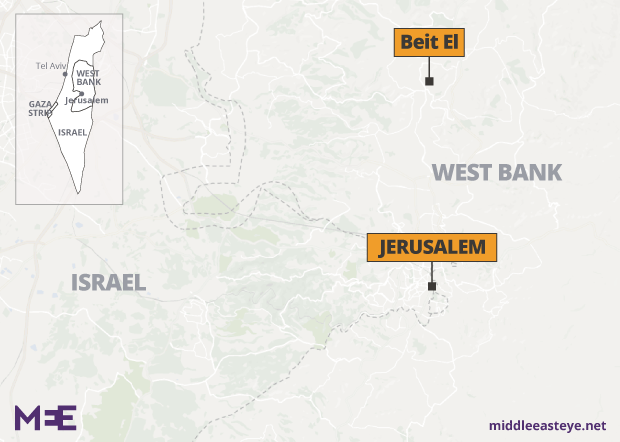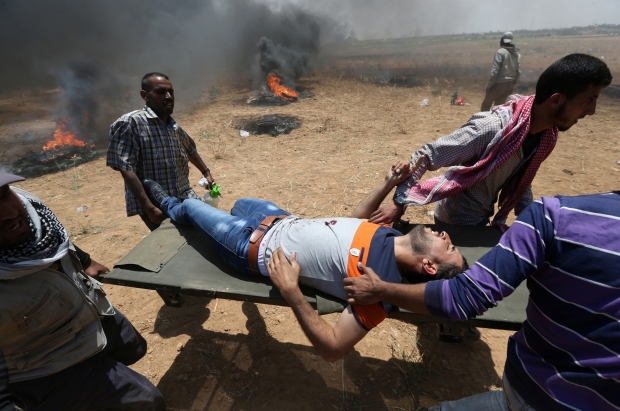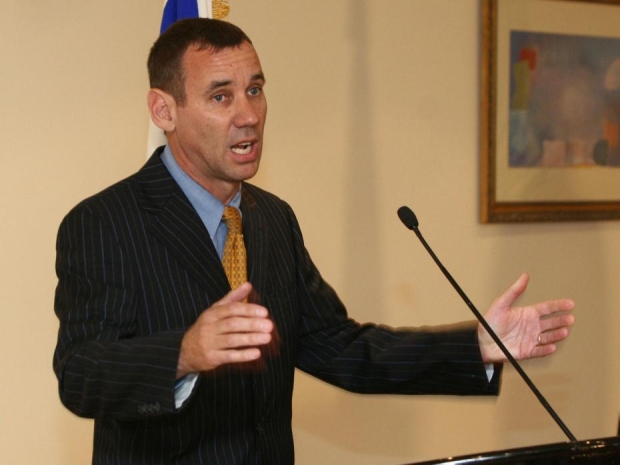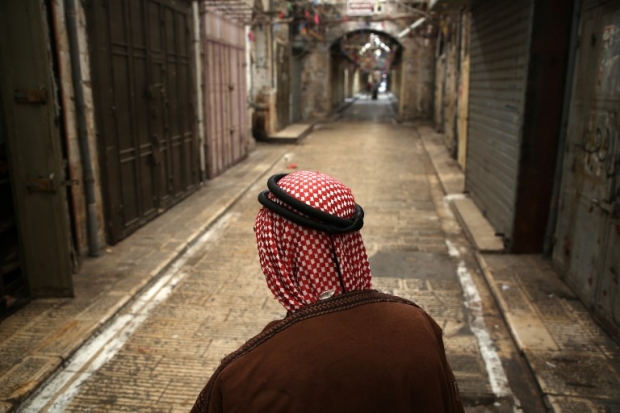LATEST: Gaza sees more protests and violence on Nakba Day, after 62 killed
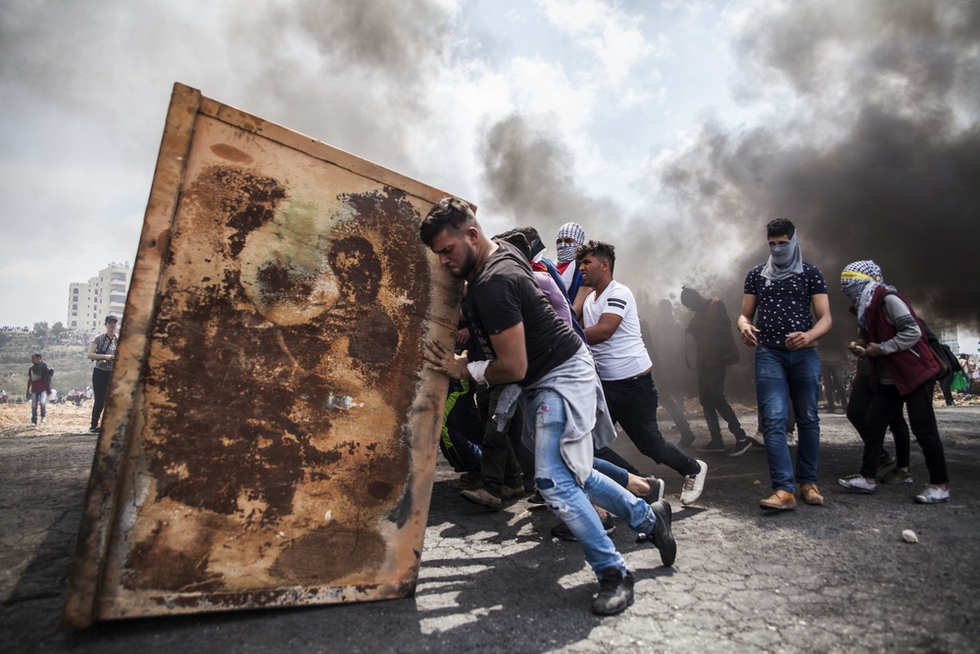
Tuesday marks the 70th anniversary of the Palestinian Nakba - or catastrophe - and the culmination of the Great March of Return protests along the Gaza Strip's frontier with Israel.
- Mass protests are expected on Tuesday in besieged Gaza and the occupied West Bank.
- Israeli forces killed 60 Palestinians on Monday in protests near the Gaza "security fence", including an eight-month-old baby.
- The US officially moved its embassy to Jerusalem on Monday, which also marked the 70th anniversary of the founding of Israel.
We'll be keeping you updated here throughout the day.
Feel free to leave comments and news tips below; we’re also on Twitter @MiddleEastEye and Facebook.
Mises à jour du direct
BEIT EL, Occupied West Bank - MEE correspondent Tessa Fox is outside Beit El, an Israeli settlement in the Occupied West Bank.
Heavy Israeli army presence outside the settlement of Beit El in the West Bank. Soldiers are using live fire and acting very aggressively against unarmed protestors, she said.
Maybe 500 protestors are here and in a short space of time, they have been pushed back by the Israelis away from the settlement without any reason.
LONDON - Speaking before an urgent debate on the situation in Gaza, the UK's Middle East Minister Alistair Burt said it was “clear” that the UK supports an “independent investigation into what has happened”.
He added that the US embassy move was “not supported by the United Kingdom” and is not “conducive” to peace in the region.
LONDON - Labour MP Richard Burden has raised the export of UK weapons to Israel in the context of the killings in Gaza. Speaking in parliament, he asked Middle East minister Alistair Burt what it would take "for the UK to enforce its own arms export criteria and stop arms sales to Israel."
He was referring to this story last month, in which Middle East Eye revealed that the UK government has approved the sale of nearly $500m in arms to Israel since 2014, including sniper rifles and sniper rifle parts.
Burt replied that since the start of "recent difficulties in Gaza, we have looked at all export licences in relation to Israel, and our sense at the moment is, we have no information to suggest that UK-supplied weapons have been used against protesters".
British Labour Party leader Jeremy Corbyn considered the killing and wounding of dozens of unarmed protesters by Israeli forces in Gaza as "an outrage that demands not just international condemnation, but action to hold those responsible to account.
"This slaughter follows weeks of killings of Palestinian civilians demonstrating for their right to return, most of whom are refugees or the families of refugees," Corbyn wrote.
"Coming on the day President Trump moved the US embassy to Jerusalem, it underlines the threat to peace posed by the continuing and intolerable injustices faced by the Palestinian people."
He asked the international community to put its collective authority behind achieving a lasting settlement that "delivers peace, justice and security for both Israelis and Palestinians, who have waited so long to achieve their rights."
The UK's Middle East minister Alistair Burt has just told parliament that Britain supports an independent UN investigation into the deaths in Gaza.
Hind Khoudary, a writer for Middle East Eye in Gaza, has filed her witness account of yesterday's carnage on the Gaza frontier, where scores of Palestinian protesters were killed by Israeli soldiers. A list of those shot dead by Israeli forces on Monday can be found here.
The first that we knew of the massacre to come was a rush of protesters, their faces blackened from the tyres many had set alight, rushing away from the security fence and screaming for help.
At about 3pm on Monday, Palestinians had got close to the fence and the Israelis let rip - the crack of M16s and sniper rifles rang out and bodies began to drop along the perimeter.
Blood-soaked stretchers streamed from the protest area as the injured were moved from the kill zone - many suffering bullet wounds but also some missing limbs.
A number of those injured were too near the Israeli fence and were beyond the help of ambulances. Instead, Palestinians rushed to their aid on horseback, in carts and on motorbikes. Others were simply carried on the backs of their comrades, all under withering fire.
According to the Palestinian health ministry, 59 people, including a paramedic and a baby, were killed on Monday. 2,410 were wounded. Of those, 79 suffered neck and head injuries, 161 were injured in the upper part of the body, 62 were injured in the chest and back, 52 in the stomach and 1,055 were injured in the lower extremities.
This mid-afternoon massacre came after a morning of peaceful but angry protest - Palestinian national songs were sung by the tens of thousands along the demonstration line, kites flew in the sky, the elderly walking with crutches towards the fence alongside children holding their parents' hands.
'This is the 1948 lands, it was occupied by the Israelis, we were driven from our homeland, that is why we are here demanding the right of return'
- Palestinian father talking to his children
There was anger over the celebration in Jerusalem of the US relocating its embassy, a move symbolising America's recognition of Jerusalem as Israel's capital.
A hint of the carnage to come could be gleaned from the boys collecting tyres to burn in order to create a thick, acrid smokescreen and block the views of Israeli snipers, who had killed more than 40 people in five weeks of protest over the right of return of Palestinian refugees to their ancestral homelands.
The toll from Monday's carnage topped those five weeks.
"This is the 1948 lands, it was occupied by the Israelis, we were driven from our homeland, that is why we are here demanding the right of return," said a father talking to his children, while pointing to what is now Israel.
Added to this is the situation in Gaza - 11 years of Israeli blockade, poverty, war and conditions for 1.4 million residents that have been described as the biggest open prison in the world.
That can in part explain why Palestinian youth have nothing to lose, and are prepared to put their lives on the line knowing that they can be shot and killed at any minute.
Palestinian students at Tel Aviv University marked the 70th anniversary of the Nakba by singing the Palestinian national anthem Mawtini (My Home Land), written by poet Ibrahim Tuqan (1905-1941).
Students said the absentee funeral prayer for Palestinians who were killed in Gaza Strip on Monday and carried slogans on cardboard that condemned the Israeli army's use of lethal weapons.
Translation: In one voice, Palestinian students sing Mawtini in a sit-in at Tel Aviv University today, marking the 70th anniversary of the Nakba.
The UK’s Middle East minister, Alistair Burt, has issued the following statement after Israel killed 59 Palestinians in Gaza during protests that erupted after the opening of the US embassy in Jerusalem.
“The violence today in Gaza and the West Bank has been shocking. The loss of life and the large number of injured Palestinians is tragic, and it is extremely worrying that the number of those killed continues to rise.
“Such violence is destructive to peace efforts. We have been clear that the UK supports the Palestinians’ right to protest, but these protests must be peaceful.
“It is deplorable that extremist elements may have been seeking to exploit these protests for their own violent purposes. We will not waver from our support for Israel’s right to defend its borders. But the large volume of live fire is extremely concerning. We continue to implore Israel to show greater restraint.
"The UK remains committed to a two-state solution, with Jerusalem as a shared capital. All sides now need to show real leadership and courage, promote calm, refrain from inflaming tensions further, and show with renewed urgency that the path to a two-state solution is through negotiation and peace.”
Mark Regev, the Israeli ambassador to the UK and the spokesman for the Israeli prime minister during the last Gaza war, has blamed Hamas for inciting violence in Gaza on Monday.
He rejected widespread allegations that Israel had indiscriminately fired on Palestinians. Here's the link to the interview and excerpts from its first few minutes.
"We didn't want to see this violence in Gaza and we did everything we could to avoid it.
"We dropped leaflets urging people not to attack the border. We used social media, we used radio and television broadcasts.
"We didn't want to see it."
On why guns were used on largely peaceful protesters, who were armed with nothing more than "the odd rock"
"It's far more than the odd rock. You have people charging the fence with wire cutters, with explosives, with Molotov cocktails, with other weapons. We used live fire in only a very measured way in a very surgical way and only when there is no alternative."
"Their goal is clear and Hamas has articulated the goal.
"The leader of Hamas, Yahya Sinwar - and I am quoting him - says 'our goal is to breach the border, to get inside Israel and to kill Israeli citizens'.
"He said openly 'we want to tear out their hearts' - his words not mine."
On Gaza's ongoing protests
"I reject that and I reject the premise of your question that this is somehow a spontaneous protest. If people want to protest against Israel inside Gaza of course they can do so. They can't of course protest against Hamas, heaven forbid.
"If they are demonstrating inside Gaza no one would interfere, but we are talking about people storming the border, the idea to damage the border fence, and come into Israel and hurt our people on our side of the frontier. That is what Hamas themselves articulated.
"If one wants to talk about what happened 70 years ago... let's be clear the Palestinians were offered by the United Nations a state next to Israel 70 years ago. They said no. They should ask their own leadership why aren't they celebrating 70 years of an independent Palestine.
On conditions in Gaza and Hamas
"The people of Gaza live a very difficult life. But that’s because they live in a prison controlled by Hamas – a theocratic authoritarian regime that instead of investing its energy and resources into building a better life for the people of Gaza, invests its efforts in a holy war against Israel."
On Israeli use of force
"We used live fire in only a very measured way in a very surgical way and only when there is no alternative. You had some 40,000 people yesterday involved in violent riots on our border.
"There were continuous attempts to storm the border and breach the border. We have to protect our people. If we allow the Hamas terrorists to enter Israel we will have dead Israelis. We must protect our border."
The Gaza health ministry has just reported that 16-year-old Talal Adel Ibrahim Matar has died of wounds suffered during yesterday's protest. Monday's death toll in Gaza has now risen to 60, including eight children.
The Gaza health ministry has updated the death toll from Monday's demonstrations. In total, it says, Israeli forces killed 59 Palestinians and wounded 2,771 during demonstrations that took place across eastern Gaza, near the fence separating the blockaded Palestinian territory from Israel.
Of the dead, at least seven were minors, including eight-month-old Leila al-Ghandour, who died after being exposed to large quantities of tear gas.
At least 54 people remain in critical condition as of Tuesday morning.
According to the ministry's statistics, roughly half of the wounded - 1,359 to be exact - were shot with live ammunition, a number corroborating reports by MEE's correspondents in Gaza yesterday, who spoke of indiscriminate shooting towards the crowds.
Stores are shuttered and public servants are staying home in the West Bank, Gaza and East Jerusalem this morning as Palestinians mark the 70th anniversary of the Nakba.
Palestinian Authority President Mahmoud Abbas has also called for the general strike to mourn at least 59 Palestinians who were killed by Israeli forces in Gaza yesterday.


